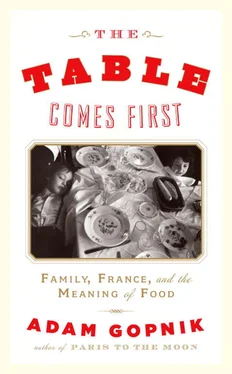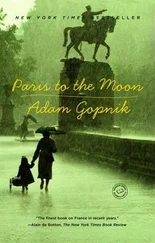Yet, though the end of the poem may be to get the dish in bed, its entertainment lies in how many steps it takes to get there. Though the end is salt, sugar, and fat in high solution, the entertainment lies in how we get there, too. It is not as if anyone thinks the story would be improved if Jane Austen described Darcy and Elizabeth actually screwing—not because these things violate the conventions but because they are so obviously the point that it is embarrassing to see them spelled out. We elide them not because we don’t want to know but because we know already. Salt, sweet, fat, and starch, caffeine, alcohol—we juggle these simple things in endless rounds, just as we juggle our limbs and other simple things night after night (if we’re lucky) out of a conviction that while the substance of the exertion sustains life, it is the variety that keeps life interesting. The truth that variety is the spice of life carries within it the implicit recognition that monotony is the daily meal.
All appetites have their illusions, which are part of their pleasure. That’s why the husband turns those pages in bed. The truth is that we don’t passively peruse the pictures and leap to the results; we actively read the lines and internally act out the jobs. The woman who reads the fashion magazines isn’t passively imagining the state of having; she’s actively imagining the act of shopping. (And distantly imagining the act of wearing.) She turns down pages not because she wants merely to look again but because, for that moment, she really intends to buy that—for a decisive imagined moment she did buy it, even if she knows she never will. Reading recipe books is an active practice, too, even if all the action takes place in your mind. We reanimate our passions by imagining the possibilities, and the act of wanting ends up mattering more than the fact of getting. It’s not the false hope that a dish will turn out right that makes us go on with our reading but our contented resignation to the knowledge that it won’t ever, quite.
The desire to go on desiring, the wanting to want, is what makes you turn the pages—all the while aware that the next Boston cream pie, the sweet-salty-fatty-starchy thing you will turn out tomorrow, will be neither more nor less unsatisfying than last night’s was. When you start to cook, as when you begin to live, you think that the point is to improve the technique until you end up with something perfect, and that the reason you haven’t been able to break the cycle of desire and disillusion is that you haven’t yet mastered the rules. Then you grow up, and you learn that that’s the game.
3. E-MAIL TO ELIZABETH PENNELL:
Anchovies, Bacon, Lamb
Dear Elizabeth Pennell:
Or Liz, if I may. The thrill of coming across someone in another time whose take on the world resembles your own—not in the big things, which are common enough to be shared, but in the small ones—is enormous . We all expect people in the past to love their children, seek a better world—but we are stunned when they prefer a Volnay to Château Pétrus, or roast chicken to veal saddle. We expect nineteenth-century people to be noble, but not to be nice , exactly—we sometimes expect them to fight for women’s rights and envision the democratic age, but we also expect them to like saddle of veal and old port.
So, coming upon you and your work while reading about recipes gives me the sense of a friend at court: greedy, Francophile (but with enough Italy in you to make you introduce pasta to your readers), and aesthetic. And then, more selfishly, you gave me a form. I had wanted to write recipes for this book—what is the point of writing a book about food if you cannot put in the ways to make the food you like best?—but realized that it was an inappropriate idea. A wildly inappropriate idea, actually. Quite apart from the question of compromising the dignity of the essayist, full of wise saw and modern instance, by perkily telling you how to make rice pudding, there was the obvious truth that any recipes I have, apart from one, are not really my recipes, but other people’s that I happen to like or cook a lot.
Yes, of course, everybody’s recipe is someone else’s recipe, with the exception of those few rare new things that someone really did invent. (I’ve invented one, sort of.) But there is a recipe that has, so to speak, through suffering become yours, unlike those that you have simply copied out of a book. We recognize the concept of sweat equity in recipe writing: if you have labored nightly over a stove in a restaurant kitchen cooking the thing, then you can write it down, even if its origins lie ultimately not in your own mind but in someone else’s cooking. But if you have merely written down what someone else wrote down first, having cooked it in the meanwhile, it isn’t yours. In your beautiful book, though, you offered both the method and the object. The method, which you invented, of turning every recipe into a little story, a bit of narrative, shows that recipes need not be neat tables of chemical interactions but short stories of mixed emotions: what I did that day, and why I did it.
And then I liked the idea of our conversation, however much it might be a dialogue des morts . You were the woman who, in the nineteenth century, without a vote or often a voice, save for a small one in the Pall Mall Gazette , had the nerve to call herself not a housewife or a domestic philosopher but a Greedy Woman—not cooking for her children or organizing her household but eating for the thrill of it. I loved that. And here was I, another writer in a weekly magazine, doing the reverse in a way, eating for pleasure but also cooking for a family… a kind of dialogue of amateurs, with the understanding that your announcing yourself as an eater first of all was as weird then—“subversive” would be the academic word, but the wrong one—as my announcing myself a cook first of all is now. The man in an apron is as typical, and yet as awkward, as wistfully underexpressed , an invention at the beginning of the twenty-first century as the woman with a napkin tucked under her chin was at the end of the nineteenth. I eat from greed! was your brave announcement. I cook from need! is my far less nervy but equally awkward one. The man in the apron, the woman with the napkin—you see them everywhere but they rarely speak for themselves. So let me write to you, and if the exchange of recipes is notional, or imaginary, well, recipes from the dead are the sum total of what civilization is .
Did they have “secret ingredients” in your day? When I was a child, secret ingredients were everywhere. Colonel Sanders had a secret recipe; the recipe for Coke and Pepsi were murmured over; one had orange zest and one had lemon. (Or so they said: I grabbed only the most surreptitious sips and clandestine snacking of either, with my mother. Save, now that I think of it, for a brief, six-month phase when my family lived in your town, London, where we got KFC chicken on several occasions. My mother’s rules of engagement were somehow suspended in a place which, in those days, had only dank Maltese burgers and murky vindaloos for takeout.)
But even beyond that, there were cooking secrets. People, chefs, on television, the Galloping Gourmet for one, winked, hard, at the camera, when people asked about them. I recall reading a piece in Time magazine when I was about eight, about a man who made omelets at parties. Chic people in New York had this guy in a tux over to make omelets—with sour cream, as I recall. It was a big thing. And when asked—I know that memory plays tricks, but I recall this with indecent clarity—he said that his secret ingredient was Tabasco sauce, and he added more the later it got and the drunker the guests got. I think the word “drunk” wasn’t in there, but that was the sense. The excitement I felt then, at the idea of someday landing at such a party, where, holding your drink and smirking in your dinner jacket, you would nonchalantly order an omelet, as James Bond himself might order an omelet! “One. With sour cream. Oh—and double the Tabasco. Your… secret ingredient? Poured by hand, please.” (I wrote a spy novel of my own in that period, called “To Be or Not To Be,” my first extended work—come to think of it, I haven’t written anything as continuously extended since—in which, varying the shaken-not-stirred martini formula, I gave the rather Bond-like hero a notable weakness for cream doughnuts.)
Читать дальше












